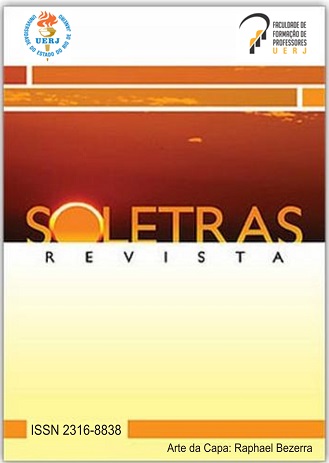Percursos históricos sobre ensino de Língua Inglesa no Brasil
DOI:
https://doi.org/10.12957/soletras.2025.90101Palavras-chave:
Língua Inglesa, Historiografia Linguística, Ensino, Gramática de CastroResumo
Neste artigo, temos como objetivo produzir um exercício investigativo com o intuito de desvelar questões históricas, econômicas e políticas sobre ensinar e aprender língua inglesa no Brasil e contribuir com a (re)significação do ensino do idioma nos múltiplos contextos de educação formal. Para tanto, produzimos um estudo historiográfico que remonta aos primeiros marcos da estatização do ensino do idioma e a profissionalização do professor de língua inglesa no Brasil, que, conforme pontua Santos (2022 a), aconteceram no século XVIII, momento em que Sebastião José Carvalho e Melo, mais conhecido como Marquês de Pombal, escreve as primeiras orientações para a institucionalização do ensino nas colônias Portuguesas, e no século XIX, com a criação da primeira cadeira para o ensino de língua inglesa no território brasileiro. À luz dos estudos historiográficos (Jakobs, 2001; Pimentel, 2001; Swiggers, 2009) e ancorados nos pressupostos dos Estudos Linguísticos, em particular àqueles que se conectam à Historiografia Linguística (Koerner, 1995; Nascimento, 2002), esperamos que o texto possa contribuir com estudos futuros sobre a construção de políticas públicas e políticas linguísticas para o ensino de inglês no Brasil, assim como ajudar professores e estudantes no processo de (re)significação de premissas e (re)elaboração de tradições que permeiam as praxeologias de ensino do idioma no país.
Downloads
Publicado
Edição
Seção
Licença
A aprovação dos artigos implica a cessão imediata e sem ônus dos direitos de publicação nesta revista. O(s) autor(es) autoriza(m) ao Programa de Pós-graduação em Letras e Linguística (PPLIN) a reproduzi-lo e publicá-lo na revista SOLETRAS, entendendo-se os termos “reprodução” e “publicação” conforme definição do artigo 5° da Lei 9610/98. O(s) autor(es) continuará(rão) a ter os direitos autorais para publicações posteriores. O artigo poderá ser acessado pela rede mundial de computadores (http://www.e-publicacoes.uerj.br/index.php/soletras), sendo permitidas, a título gratuito, a consulta e a reprodução de exemplar do artigo para uso próprio de quem o consulta. Casos de plágio ou quaisquer ilegalidades nos textos apresentados são de inteira responsabilidade de seus autores.



